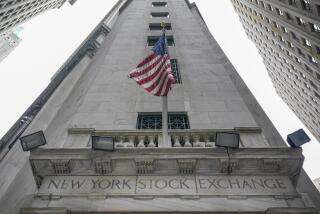Wall Street Has Mixed Reactions to Drexel’s Troubles
- Share via
The bankruptcy filing of Drexel Burnham Lambert’s parent has dealt another psychological blow to the securities industry, already suffering from losses, layoffs and a dearth of investors, market executives said Tuesday.
Nevertheless, many in the industry had mixed feelings about Drexel’s fall, apparently weighing its potential negative impact on investors and brokers against a general dislike for the once high-flying firm that rose from obscurity to national prominence in less than a decade.
Moreover, some anticipated a hike in business as Drexel customers and employees leave the troubled firm. Executives said they were preparing to absorb disenfranchised customers and employees of their fallen rival.
“In light of Drexel’s difficulties, (we are) re-examining our growth plans with a view toward accelerating the expansion of our staff,” said Michael Tennenbaum, vice chairman of investment banking at Bear, Stearns & Co. in Los Angeles.
Another Wall Street executive said: “What you don’t realize is how hated Drexel was on the street. When they came into the market, they bit and scratched and kicked and did everything possible to be disliked by other firms. On the other side of this great falling structure, you’ll find a whole bunch of hands helping to push them over.”
Although Bear Stearns will not be actively calling on Drexel’s clients or its employees, Tennenbaum said he expects a substantial number of both will try to abandon the firm, and Bear Stearns will be ready.
“We are going to start the Bear Stearns adoption service today,” Tennenbaum said.
“We are not running with our business cards to the sight of every accident, mind you. And we truly do regret the dislocations. But we expect the financial community will be able to expand their business and their staffs in a way that will mitigate the negative impact to all the affected parties.”
Other firms also privately acknowledged that they were expecting to benefit.
Still, the fall of such a prominent firm could prove unsettling to investors, who have grown increasingly skittish of Wall Street following a series of investment scandals, steep stock price declines and total chaos in the junk bond market. Investors are also worried that the economy could slip into a period of “stagflation,” which is a period of slow economic growth combined with rising inflation.
“This is certainly not going to be constructive on the business as a whole,” said Roland Seidler Jr., chairman and chief executive of Seidler Amdec Securities in Los Angeles. “To some extent, these kinds of problems will have the same effect on our business as the collapse of savings and loans had on their business. If the worst-case scenario is played out, it will affect all of us in the investment banking industry.”
Moreover, it may leave hundreds more investment bankers out of work at a time when the industry is contracting.
The nation’s biggest firms--including Merrill Lynch, Shearson Lehman Hutton, Salomon Bros., Goldman, Sachs & Co., Prudential-Bache Securities and First Boston--have all cut back either on staff, bonuses or commissions to combat declining revenues.
Those declining revenues are largely blamed on a massive flight of individual investors from Wall Street following the October, 1987, market crash and several mini-crashes since. And they’ve become disillusioned about the market’s fairness following the indictment of several of Wall Street’s most prominent figures.
Meanwhile, merger and acquisition activity--a major revenue producer for big investment banking houses in recent years--has all but dried up in the wake of the junk bond market’s near demise. Junk bonds, which financed many of these big buyouts, have fallen out of favor. Prices for most junk issues have dropped between 20% and 40% since last year, and industry executives say it is nearly impossible to issue any new bonds.
“This is very unfortunate news,” said one First Boston executive of the Drexel demise. “What the securities industry needs is more significant broker-dealers, particularly in the high-yield market. This is going to have a negative impact on market liquidity.”
More to Read
Inside the business of entertainment
The Wide Shot brings you news, analysis and insights on everything from streaming wars to production — and what it all means for the future.
You may occasionally receive promotional content from the Los Angeles Times.







